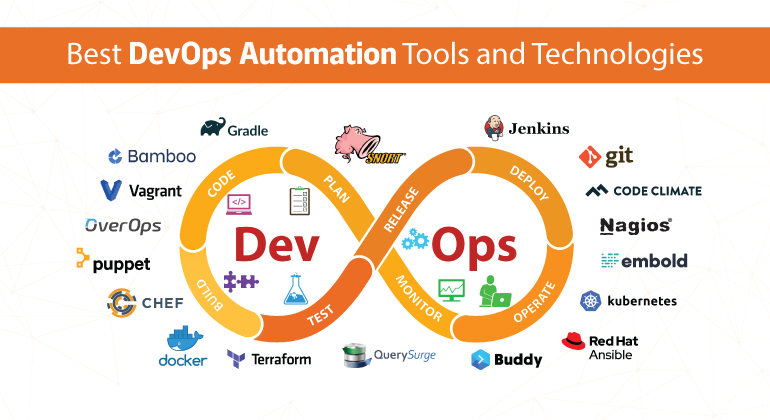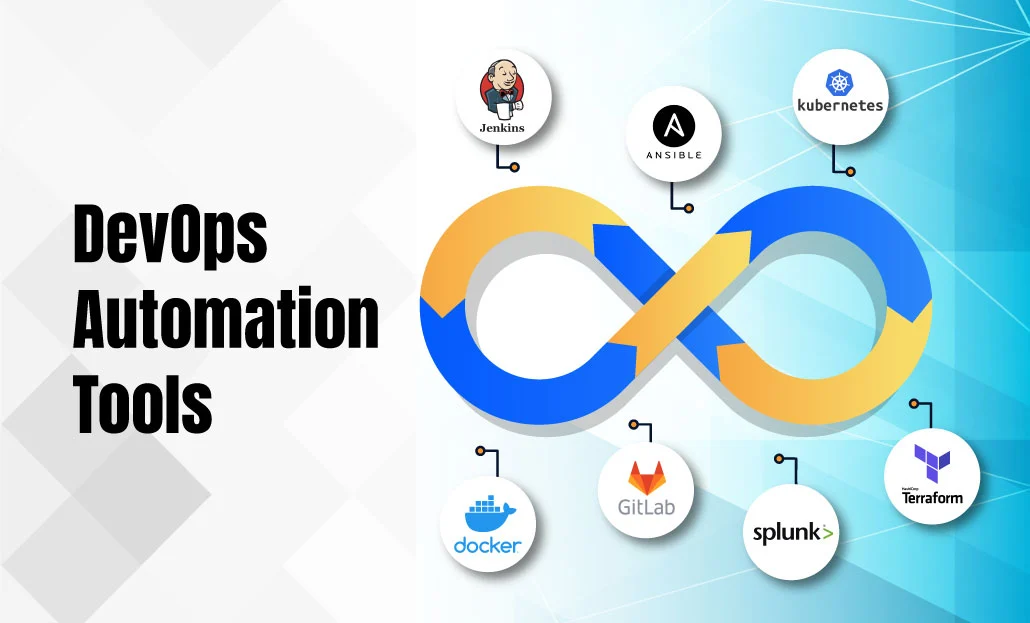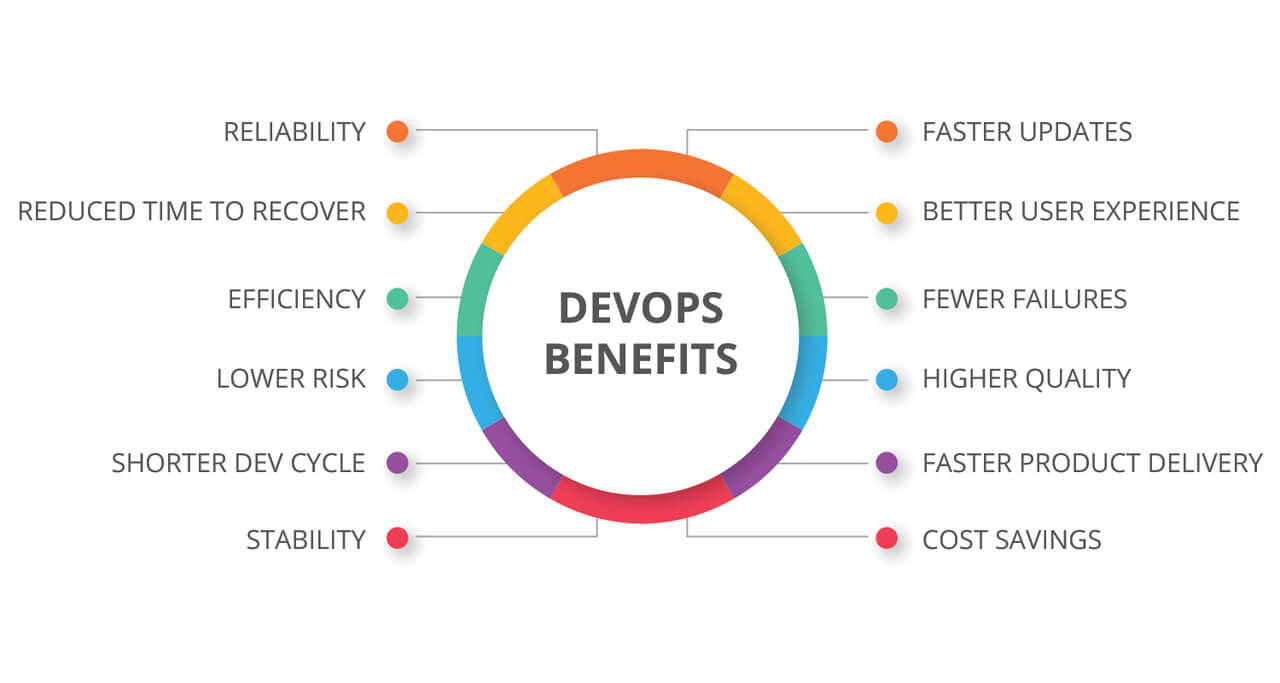
Are you looking to modernise your DevOps approach? DevOps Automation tools can be great for simplifying IT operations and improving performance. In this blog, we will look at various automation tools such as cloud automation, infrastructure automation, and IT solutions. We will also provide advice on which one is the best fit for your organisation and how to implement them effectively. Read on to learn more about empowering yourself with these amazing automated DevOps processes!
Overview of DevOps Automation Tools

DevOps Automation Tools are gathering steam as automation is becoming increasingly essential in the DevOps process. Whether it’s setting up infrastructure, spinning servers or putting into action applications, automating these jobs can help organisations become more efficient and agile. Luckily there are a great deal of automation tools available for DevOps teams to use during their workflows.
Chef is an open-source configuration management tool which allows speedy consistent application deployment across server platforms and provides automated solutions such as configuring systems at scale with no fuss; install patches conveniently so when would you need something like this? Chef could be your answer!
What else could you ask for? Chef provides an infrastructure that is completely managed through code, meaning users can simply replicate their development environments. Not only this but a key feature of Chef is its built-in integration with other popular cloud providers such as Amazon Web Services (AWS), Microsoft Azure and Google Cloud Platform (GCP). That makes it even more convenient!
On the other hand, we have Ansible – another leading configuration automation platform which supports multiple vendors and products all in one place. It helps to speed up the process of setting up your cloud infrastructure by supplying ready-made templates which can be used straight away or customized according to the user’s needs.
Ansible is a great way to make sure complex multi-tier applications can be deployed effortlessly on cloud services. With just one command, Ansible Tower helps teams manage deployments from one single place without needing any manual input – making life easier for developers and operations staff alike! Jenkins is another useful DevOps automation tool that allows users to better control their code deployments via CI/CD pipelines.
It integrates with various development platforms such as GitHub, providing an easier way of maintaining version control; plus you can create custom build rules so automated tests run each time there’s a new build before deploying it into production environments – genius right?
Finally, we have Puppet: this configuration management tool offers the ability to automate repetitive tasks across heterogeneous systems using its domain-specific language (DSL). So defining what installed packages are needed or which services should be running becomes straightforward – helping you get your desired system state in no time!
Understanding the Importance of Automation in DevOps

Automation is an essential part of DevOps processes, allowing developers to work quickly and efficiently. It’s not just about speed – it helps reduce mistakes and free up resources that can be put towards more important tasks. Automating aspects like deployments, builds, testing etc in the development process means companies get higher output while keeping a high standard of quality.
On top of that automating allows developers to focus on where they can bring the most value – writing code rather than managing infrastructure components or debugging complex configurations which are time-consuming activities better performed by computers anyway!
Automation tools like Ansible, Jenkins and Kubernetes make it far easier for developers to deploy applications into production environments without having to alter existing processes. This speeds up the entire process of collaboration on a project too – teams can rapidly set up new environments as required. With DevOps processes being automated in this way, companies also get access to cloud computing services such as Amazon Web Services (AWS) or Microsoft Azure with added benefits including scalability, reliability and security; all-important traits when working online!
Automation makes life simpler for companies when it comes to rolling out services rapidly, without needing to configure each service independently for every single environment. This lets them take advantage of virtual machines as and when they are needed which ultimately helps organisations save time and money whilst being able to scale applications at will.
But perhaps one of the greatest advantages is that automation in DevOps reduces errors caused by humans – like automatically setting up servers or deploying new versions of a software application etcetera. Automated testing frameworks such as Selenium support this further, making sure all changes have been tested completely before deployment thus guaranteeing maximum QA with minimal human effort required!
Exploring Top DevOps Automation Tools

One of the most exhilarating elements of modern software development is the introduction of DevOps automation tools. Automation has completely changed how developers go about their work, making it much simpler and faster to launch complex applications and services. Nowadays, there’s a wide range of devices out there that enable companies to automate aspects of the DevOps process – from organising infrastructure to rolling out updates as well as deploying code. In this blog post, I am going investigate some of the leading DevOps automation tools available today. Have you ever used an automated tool for your projects? How did it turn out for you?
Some of these are open-source solutions while others are commercial offerings tailored to specific use cases. Take Ansible for example, it’s a popular open-source automation tool that helps teams manage their infrastructure, applications and services with the help of declarative YAML files called playbooks.
It is mostly used in configuration management tasks like setting up servers or deploying code, but you can also do more complex things such as building intricate application pipelines or managing databases – quite impressive! All this can be done without having any coding skills whatsoever; all it takes is understanding the basics of how an automation engine works.
Ansible is surprisingly straightforward, even if you don’t have any programming skills – in not much time at all, you can get the essentials down and start automating your systems. Chef is another well-known DevOps automation tool which assists teams in managing their infrastructure with a bit of automation thrown into the mix – it uses Ruby-based configuration files called “recipes” that determine how every resource should be set up on each node within your system. How great would it be to automate this kind of complexity?
In contrast to Ansible, getting started with Chef requires a bit more knowledge but has more powerful features like continuous integration and deployment abilities plus the support of multiple cloud providers. Lastly, there is Puppet – another strong open-source solution that provides an array of qualities designed for managing larger infrastructures effectively and dependably.
Just like Ansible or Chef, Puppet uses recipes written in its own Domain Specific Language (DSL) to set what should be done on each node within your setup – yet the major emphasis here lies in pushing out preferred setups across all nodes constantly throughout your entire network rather than merely individual machines similar manner as does Ansible or Chef do.
Role of Automation Tools in DevOps Solutions

The importance of automation tools in DevOps solutions cannot be understated. Automation gives the DevOps team the power to build, test and launch software applications rapidly with minimal manual labour required. Doing this makes complex processes simpler but also increases speed and flexibility. Even tedious jobs like setting up virtual machines for development or doing regression testing after every release can now be automated – something which is not only time-saving but helps make sure that reliability and scalability are maintained at all times while allowing greater nimbleness for DevOps teams alike! So how exactly can automation benefit you?
When it comes to DevOps automation tools, you can find them in a variety of forms. Some offer comprehensive solutions for your Continuous Integration/Continuous Delivery (CI/CD), just like Jenkins does; while others let you pick out separate tasks such as testing or infrastructure provisioning, Puppet and Chef being two examples. To ensure all duties are automated effortlessly and dependably, it is sensible for DevOps teams to have both types of useful resources at their disposal. The trick here lies in finding the right mix which meets the team’s needs yet gives them the necessary features they require.
When it comes to selecting an automation tool for your DevOps group, the most significant factor is user-friendliness. Automation tools must be designed in such a way as to make them easy so teams can use them with the least amount of effort required plus no training necessary. Moreover, searching for something which has elaborate documentation on how you can utilize the asset efficiently would be a smart move – this allows newcomers to get up-to-speed easily. Another essential element is help – make sure that you go with a solution from a vendor who offers customer service if needed. Doing this will ensure any incidents get solved promptly allowing continuous automatisation without hitches or delays.
Benefits of Implementing DevOps Solutions

DevOps is a concept that has revolutionised the way we look at automation in software engineering. Its goal was to make development and operations simpler, more effective and dependable. But what are the actual advantages of introducing DevOps solutions?
The biggest benefit of DevOps is it amplifies cooperation between dev and ops teams. By forming bonds between these separate groups, they can cooperate better so any new features or adjustments get implemented accurately with no performance issues arising. This makes sure everybody’s on point for a successful outcome!
Additionally, they can swiftly sort out any issues or bugs that show up while the development and deployment are taking place. This helps to bring down expenses connected with bug fixes since they can be recognised and settled fast before they cause too much harm.
Another tremendous benefit of using DevOps solutions is amplified velocity. With automation tools, developers can put into action changes quicker as well as roll them out speedier than ever before. Additionally, automated testing guarantees that revisions are applied effectively without bringing about any usefulness problems on live systems; this implies customers get new features sooner whilst still being guaranteed from potential vulnerability due to unforeseen conduct from untested code.
In summary, implementing DevOps solutions brings a variety of advantages which assist software engineers in making better products faster than ever previously achievable by fostering collaboration between departments and automating activities such as releasing or evaluating – companies may reduce downtime or intricacy concerns in their frameworks while cutting back significantly on costs associated with manual tasks like bug-fixing or hand-operated deployment procedures.
Dive into the World of Cloud Automation

Are you after gaining an edge in the cloud automation environment? Are you a DevOps engineer searching for ways to get around modern DevOps automation tools? If that’s so, then this is your chance! DevOps automation tools provide numerous advantages when it comes to simplifying workflows and optimising operations. With help from cloud automatics, Devops engineers can construct and control software shipping pipelines with ease, skillfully and confidently. How impressive would such capacities be?!
No doubt cloud automation has a lot to offer DevOps engineers. It enables them to deploy updates, check code for errors or security issues and integrate multiple systems into one single process with minimal overhead and human input. So it is not just about saving valuable engineering resources but also spending more time on the things that matter – such as optimising the performance of applications or creating new products – rather than mundane administration tasks!
Cloud automation has made life simpler for developers and those involved in DevOps thanks to the scalability solutions it provides. It allows businesses to adjust their resource allocations according to changing demand without adding extra cost or complexity to existing workflows. Not only that, automated processes are consistent and repeatable meaning teams can deliver high-quality results at scale with ease.
Investing in modern infrastructure like cloud automation pays off big time if you are looking to reduce costs or speed up development cycles; plus it means engineers have more time on their hands as they don’t need to spend so much of their energy managing resources – freeing them up focus on creating valuable software solutions quickly! So why not make this advancement part of your business strategy?
How Cloud Automation complements DevOps?

Cloud automation has become a real hit with DevOps teams, giving them the chance to streamline their processes and automate those dull jobs. It is an essential part of DevOps as it allows groups to build and deploy applications on hybrid cloud environments quickly and economically. Developers can make use of cloud automation by setting up standardised procedures for software development and deployment that they can keep using in future. Automating what you have already got lets these same teams switch from doing repetitive tasks to improving customer experience – how could your customers benefit?
Talking about its advantages, Cloud automation is terrific at providing a one-stop shop when looking at IT service delivery management platforms for app development!
It allows developers to swiftly set aside, configure, roll out and run applications on any cloud platform with a minimum amount of effort. Developers can speedily allocate resources; establish databases; monitor and manage apps; scale up or down depending upon the requirement; connect data sources; ensure security for the application stack; carry out updates automatically; and bring about cost savings effectively – all without manual interference.
This helps organisations keep a good level of agility as well as quickness in their development cycles whilst also affording them greater command over user access. Do you face problems while managing various app versions? Is it difficult to find an integrated solution that fits your budget?
Moreover, cloud automation provides DevOps teams with access to high-end analytics tools which allow them to monitor the performance of many components in their application stack instantaneously. With this data at hand, they can make smart decisions about alterations that must be done along with preemptive judgments at the beginning of a project cycle for maximum productivity.
Moreover, by taking advantage of automated cloud tools like policy as code (PaC) for configuring infrastructure as code (IaC), it gives groups better visibility into their whole system landscape and enhanced governance potentials for organisations attempting to enhance security or compliance position. It makes you wonder what lies ahead when considering new technologies such as these!
Unpacking Infrastructure Automation in DevOps

When it comes to DevOps, infrastructure automation is at the core of what makes it so effective. Automation lets developers rapidly create and roll out applications with little manual work needed; this means they can craft apps faster and more efficiently. In this blog post, we will investigate precisely what ‘infrastructure automation’ implies in terms of DevOps, as well as find out how companies can take advantage of its adoption.
So firstly let’s clarify just exactly what ‘infrastructure automation’ stands for. To put it simply, infrastructure automation involves automatically executing the setup process, configuring things correctly along with deployment steps plus ongoing maintenance and testing on servers or networks together with other IT components that build up a functioning system architecture/setup).
This all happens without any human intervention which allows organisations to save time and money during their app development lifecycle while also ensuring quality control – something vital when creating secure products today!
If an organisation wants to implement DevOps strategies, then automating its infrastructure is a must. This can help boost team productivity while significantly decreasing the chances of any errors due to human involvement in the development process. Automation tools like Chef and Puppet allow DevOps teams to operate faster than ever before with greater consistency when it comes to deploying updates or new versions of applications – resulting in less time wasted on fixing mistakes and getting things through quicker! So why not take advantage of this technology? It is worth taking into consideration if you want your app releases done quickly yet reliably at minimal cost.
Automation tools can come in real handy when it comes to a project lifecycle – from spinning up virtual machines on cloud service providers like AWS or Azure to streamlining Kubernetes clusters. This helps teams automate everyday tedious tasks such as setting environment variables or configuring security policies that would usually take ages if done manually; saving you considerable amounts of time and effort! What’s more, by using automation tools like Chef and Puppet, organisations can easily scale their applications whenever demand goes through the roof without having to provision new resources manually or reconfigure existing ones. It sounds incredibly useful, doesn’t it?
When it comes to streamlining the development process, automating certain aspects can dramatically reduce costs by doing away with labour-intensive activities like scripting and setting up server environments. On top of that, automation also gets rid of repetitive tasks which would otherwise lead to errors if done manually – leading to better code quality since these jobs are now carried out without any human interference or chances for mistakes.
Furthermore, automated tools help keep downtime when pushing through changes low as they can instantly roll back failed deployments while having minimal effect on users’ experiences and applications alike. All in all, incorporating infrastructure automation into your organization’s DevOps system is a crucial step towards getting more efficient workflows whilst keeping expenditures associated with manual processes such as configuring servers at bay.
Automated solutions make it much simpler for developers so their software releases faster while following best practices over every stage of the production cycle – ultimately resulting in a shorter time-to-market period along with lower related expenses!
The connection between IT Automation and DevOps

In recent years, IT automation has become a crucial part of the DevOps toolbox. It plays an immense role in helping teams reach success by streamlining operations and increasing precision – ultimately leading to quicker deployments and shortened development calculations. Additionally, it improves security as there is no chance of skipping or forgetting any steps throughout the dev processes.
The relationship between IT automation alongside DevOps is rather clear – thanks to automated procedures related to progressions, tasks such as code review, system testing and app release are carried out with far greater speed than usual. How vital would these activities be if they weren’t sped up?
Automation provides teams with a great opportunity to gain invaluable insights into their performance. Giving them metrics that measure how fast tasks are getting done, helps them pinpoint areas of improvement and tweak processes accordingly. Automatic tools have become an integral part of DevOps as they facilitate continuous efforts to perfect the entire software delivery process from start to finish. This implies ensuring every single step is being executed correctly and quickly too – so what could be better than automation? Asking the right questions here surely pays off!
Take IT automation, for example. It can help DevOps teams get ahead in the game by ensuring that tasks are carried out correctly and efficiently every single time. Automated testing, for instance, helps to reduce the laborious work of verifying a system works as it should before deployment – saving valuable time! Not only this but using automated deployments increases efficiency even further allowing changes to be applied quickly without having to manually configure each server when an update is needed.
Rhetorically speaking… wouldn’t you want your development cycles sped up? Wouldn’t you also love being able to release new updates more frequently than before? Leveraging the right set of automation tools tailored specifically towards your use case could give greater control over processes while enabling all these benefits at once; unlocking potential which had previously seemed unattainable!
Case Studies Showing DevOps and Automation Success

DevOps automation is the optimal method to streamline workflows and decrease manual effort. Though it can be a bit difficult to get such a system in place, looking at case studies that have achieved success with their implementation can help you comprehend how things should be done correctly. As DevOps automation tools are created for automating an array of manual processes and tasks, they offer numerous advantages.
For example, if you make use of a suitable solution there is no requirement for manually installing software or configuring private clouds as these activities could all be automated – cool, huh?
Getting things done quickly and accurately can be a major challenge for IT departments. Automating DevOps processes with the right automation tools can help save time, and money and keep your department running at maximum efficiency. What’s more, these same tools make it easy to deploy applications swiftly – whether that means rolling out something completely new or patching an existing application. By automating various aspects of development cycles you do get faster deployments without having to compromise on quality control security or performance; which makes great sense from both a business perspective as well as practicality!
What’s more, automated testing gives coders the chance to concentrate on producing top-notch code rather than fretting about potential errors before launch. Take Netflix for instance; by transitioning from manual processes over to automatized ones with their Chaos Monkey tool they managed to reduce their deployment time from two weeks down to a mere two minutes! This enabled them to experiment and develop even further while at the same time minimising any associated risk of issues occurring in production environments due to simply not having validated changes in isolated test scenarios beforehand.
The advantages of introducing DevOps automation to your current workflow are evident; faster and more accurate handling across every part of the software delivery process, along with improved steadiness due to stronger control over change management procedures. If this seems like something you’d be interested in for your team then it is a great idea to start by looking into triumphant accounts from other companies who have already applied these solutions – try finding studies specially created for organisations that work within comparable industries or areas as yours so that no significant details particular only to your field is missed out!
Amazon had impressive results when they formulated an automated deployment pipeline system for their EchoOS operating system which ended up increasing reliability thanks to its simplified yet repeatable processes used throughout each release cycle. This showcases how beneficial applying DevOps automation can be – but what would make such changes successful in my own company? It’s worth considering if you could benefit similarly…
Wrapping Up!
In conclusion, DevOps Automation Tools offer a great way for IT teams to take care of common tasks with precision and efficiency. These tools can help streamline cloud, infrastructure and IT-related processes by taking away the need for manual work – saving time as well as money. What’s more, data security is guaranteed, meaning organizations are in safe hands when it comes to using automation technology. Last but not least; automating repetitive tasks simplifies them significantly so that companies remain agile and able to react quickly to how customers need them to – leading to greater profitability over time!
Why not join us on our DevOps Master Program today and become an expert in advanced DevOps techniques? We’ve created the perfect course to give you all of the essential skills needed for a successful career as a DevOps engineer. You will learn how to develop, deploy, maintain monitor and troubleshoot applications effectively – from experienced instructors who have first-hand knowledge about what’s going on in real-life projects. Our comprehensive course will also equip you with the knowledge required to deal confidently with large-scale application management plus optimization; so your work runs like clockwork!
So why wait any longer? Get involved now and take charge of your professional journey towards mastering DevOps right away! With our courses, we guide knowledgeable professionals so that you can build up your abilities quickly – it is worth investing some time into this programme if want to progress further down this exciting career path.
Are you an aspiring DevOps pro looking to bump up your career? If so, then enrolling on our DevOps Master Program is the ideal way to get yourself ahead of the competition. Our comprehensive program gives you insights into all aspects of successful DevOps strategies and also offers hands-on practical advice from industry experts. We understand that everyone learns in different ways, so we have a choice of options for you to pick from: whether it be interactive online training sessions or more traditional lecture-style classes.
We also offer various certifications through our program, which gives your CV a bit of an extra boost when you are applying for new positions in tech. Our DevOps Master Program has repeatedly proven to deliver exceptional results – so if you complete it, that could help put you ahead of the competition when job-hunting. Plus, our tuition fees are pretty reasonable and can be split into manageable payments – no excuses! So don’t wait around any longer; take a look at our site right now and find out how signing up for the DevOps Master Program might propel your career forward faster than ever before.
Happy Learning!


